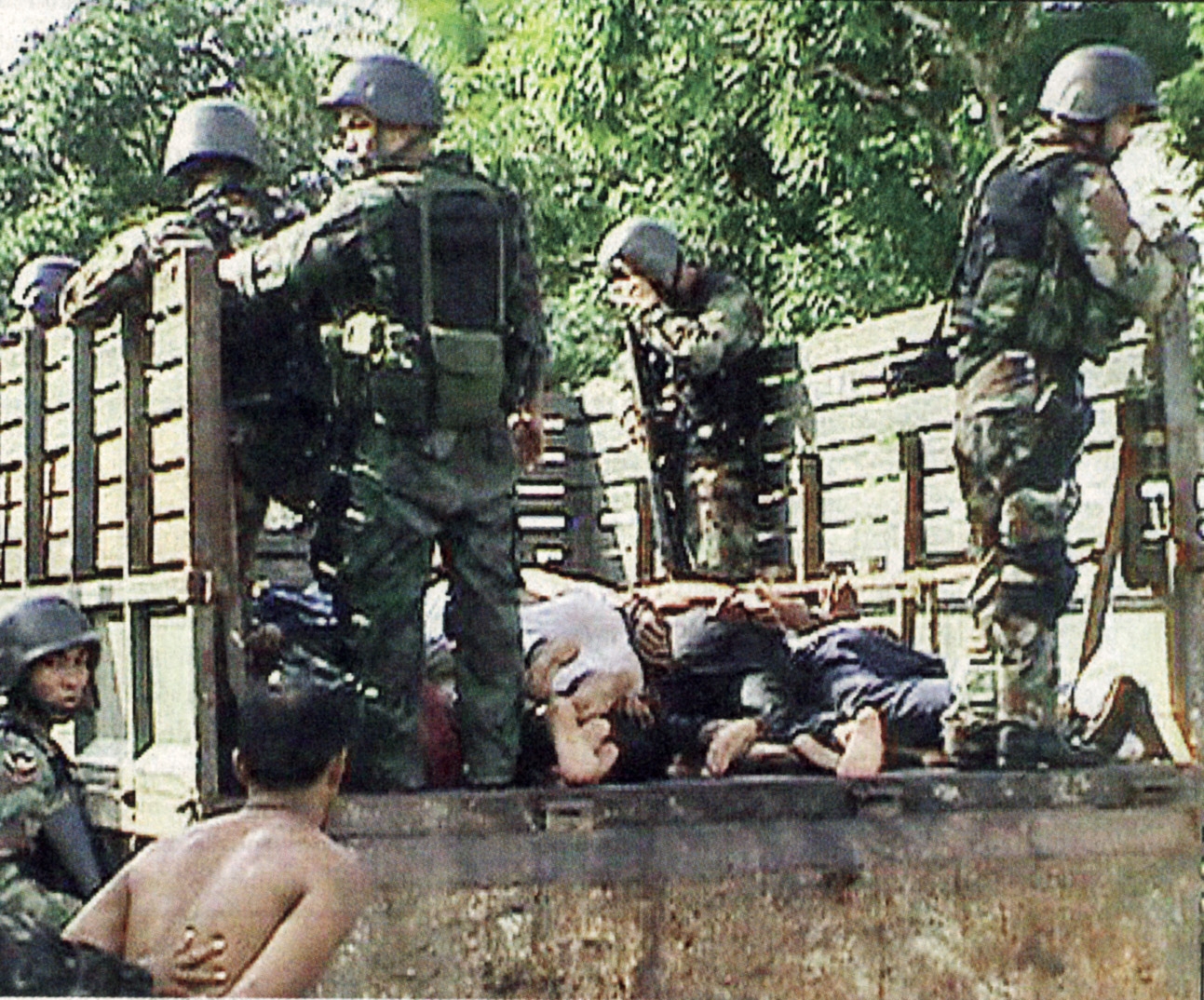Despite a significant step by the Narathiwat Provincial Court, which on 23 August 2024 found sufficient evidence to prosecute former high-ranking officials, and the subsequent Attorney General’s decision on 18 September 2024 to indict some of those responsible for the killing of 85 people in the Tak Bai massacre in 2004, justice has not been served as the statute of limitations for the offences expired yesterday, 25 October 2024.
“The Thai authorities failed to bring any of the alleged perpetrators to court in time. This outcome is a real blow to access to justice and redress for victims of serious human rights violations in Thailand and for the country’s justice system, since impunity has, once again prevailed, thus far,” said Sanhawan Srisod, Associate International Legal Adviser of the International Commission of Jurists (ICJ).
On 25 October 2004, over 1,500 protesters gathered at the Tak Bai police station, demanding the release of six detained village defence volunteers. Security forces used live ammunition to disperse the crowd, killing seven protesters. More than 1,300 people were then detained and subsequently transported for 150 kilometers, inhumanely piled on top of each other in army trucks with their hands tied behind their backs. Several hours later, by the time the trucks were unloaded, 78 people had died, and over 30 were injured.
Pursuing justice in this case has been a long journey. The criminal prosecution process was slow, with significant progress primarily driven by survivors and their relatives and occurring only a few months before the expiry of statute of limitations. Their efforts led the Narathiwat Provincial Court to decide in a landmark ruling on 23 August 2024 that there was sufficient evidence to put seven former high-ranking military, police and administrative officials on trial for their respective roles in the crowd control tactics, the transport of protesters and, ultimately, in the killing of 85 people.
Subsequently, on 18 September 2024, Thailand’s Attorney General ordered the prosecution of eight suspects, including vehicle controllers and drivers involved in the Tak Bai incident. The suspects faced charges of intentionally killing 78 people who suffocated in the backs of army trucks. One of the eight suspects is the same high-ranking military official whom the Narathiwat Provincial Court had already decided should be tried, which meant that the total number of suspects charged in the case was 14.
Arrest warrants were issued against all the suspects. However, while criminal proceedings were initiated against them, alas, even this was not enough. Under Thai law, each alleged perpetrator must be physically brought before the court before which the criminal proceedings are open to suspend the 20-year statute of limitations, which, in this case, expired on 25 October 2024.
“This case calls into question the Thai authorities’ commitment to accountability, given that, despite the fact that Thai courts issued arrest warrants against 14 suspected perpetrators, none was brought to trial before the expiry of the statute of limitations. The Thai authorities have also not done enough to inform the public, the survivors and the families of the victims about their efforts, if any, to pursue the suspected perpetrators who had fled in the meantime,” Srisod added.
“This case also further underscores the flaws within Thailand’s legal framework with respect to statutes of limitations. International human rights law requires that grave human rights violations, such as torture, extrajudicial killings and enforced disappearances should not be subject to any statute of limitations. Additionally, applying statutes of limitations to obstruct the prosecution of those allegedly responsible should not be acceptable, as it undermines the administration of justice and promotes impunity for perpetrators of grave human rights violations.”
Background
A 2009 post-mortem inquest on Tak Bai incident by the Songkhla Provincial Court concluded that the 78 men died from suffocation but failed to fully address the circumstances surrounding their deaths. No inquest was initiated for the seven protesters who were killed on the day of the protest.
In April 2024, 48 victims and the families of those killed decided to take the case directly to court, with only six months remaining before the expiry of the statute of limitations, due to the lack of progress in the criminal proceedings by the authorities. This initiative led to the Narathiwat Provincial Court decision on 23 August 2024, admitting the case for a full trial.
One of the officials the court found sufficient evidence to put on trial is retired General Pisan Wattanawongkiri, a former 4th Army Region commander and a former Member of Parliament (MP). He was an MP with the ruling Pheu Thai Party but resigned after submitting a request for leave from Parliament until 30 October 2024, citing the need for medical treatment overseas.
In line with General Comment No. 3 of the UN Committee against Torture and numerous Concluding Observations, including those on Thailand, there should be no statute of limitations for crimes of torture. The UN Human Rights Committee, in its General Comment No. 31, has also authoritatively held that States Parties must ensure that those responsible for acts of torture, as well as summary or arbitrary killings, be brought to justice.
The UN Updated Set of Principles for the Protection and Promotion of Human Rights through Action to Combat Impunity (2005) further requires States, including Thailand, to adopt and enforce safeguards against any misuse of legal rules, such as statutes of limitations, that contribute to or foster impunity.
Download
Full statement is available for download in English and Thai
Contact
Sanhawan Srisod, Associate International Legal Adviser, ICJ Asia and the Pacific Programme, e: sanhawan.srisod@icj.org
Further reading
Thailand: Court Delivers Disappointing Post-Mortem Inquest Findings in Tak Bai Incident
Thailand: A historic step towards justice in the Tak Bai incident





